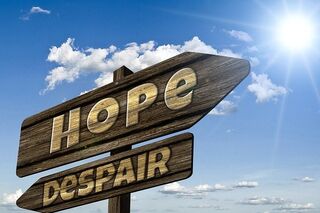Optimism
The Limits of Optimism and Pessimism
Unrealistic expectations can lead to disappointment.
Posted July 14, 2020

People in general prefer to focus on the positive. When times are hard, having hope for a better future can keep you going. Positive expectations can create positive moods, which make you more fun to be around and therefore more likable. You can lift other people up.
On the other hand, what if reality doesn't live up to your expectations? Is optimism functional then? Perhaps being too optimistic can lead you not to prepare for hard times, creating greater suffering when you face high stress or disappointment. Being pessimistic, on the other hand, may not make you feel as good. But perhaps you will be pleasantly surprised and more grateful when things turn out better than expected? The fact that the world is facing a pandemic makes this question particularly relevant. Is it better to hope for the best or expect the worst when everything is so uncertain?
Comparing optimists, pessimists, and realists
Researchers at the University of Bath looked at the wellbeing of optimists, pessimists, and realists (when it came to finances) over an 18-year period. In this study of 1601 British subjects, the researchers were able to compare expectations to financial outcomes. Expectations were measured by the questions, ‘Looking ahead, how do you think you yourself will be financially a year from now; better than you are now, worse than you are now, or about the same?’ and financial outcomes by the question, ‘Would you say that you yourself are better off, worse off, or about the same financially than you were a year ago?’ These questions were asked each year over an 18-year period. A separate study that looked at financial data, found that the second question was a valid index of actual household income.
The researchers defined optimists as those where financial expectations in the previous year were higher than outcomes the next year (e.g., you said you would be better off, but the next year you reported your income hadn't changed or you were worse off). Pessimists were those who expected less than they got (e.g., you expected to be worse off but the next year reported your financial picture hadn't changed). Realists were those whose expectations the year before matched their financial status the next year
The researchers compared optimists, pessimists, and realists on measures of psychological distress and well-being. Results showed that:
"Compared to realists, those with the most pessimistic (optimistic) expectations have a 37.2% (11.8%) higher level of psychological distress. For life satisfaction, those holding the most pessimistic (optimistic) expectations are associated with a 21.8% (13.5%) reduction in well-being when compared to realists."
Why is realism better?
Although the study was not able to provide data showing why realism was better, it's possible that too much optimism leads to disappointment and dissatisfaction down the road. Even if your income is high, if it's lower than you expected, you may feel like a failure. The pessimists in this study were the worst off. But wouldn't they be pleasantly surprised when their gloomy expectations didn't materialize? It may be that instead of enjoying their success, they persisted with a gloomy outlook. Thinking that their finances could get worse in the future may not have allowed them to enjoy their current success. Any relief they felt when expected losses didn't materialize may have been short-lived.
These interpretations are a bit speculative but make sense intuitively. The study does have some limitations in that financial optimism or pessimism may have different consequences than optimism in other areas of life. For example, being optimistic about dating success or getting a good grade may motivate you to put in more effort, making it more likely you will achieve a positive outcome. Also, the study doesn't definitely show that the optimistic or pessimistic expectations were the cause of the increased well-being because other factors may have contributed.
Research shows people are more optimistic when they expect that they will be able to influence the outcome through their efforts. Therefore, we are more likely to be optimistic about our income increasing over time, perhaps not taking into account the effects of layoffs, recessions, age discrimination, automation, or pandemics. About 80 percent of people are overly optimistic. Depressed people, while being more negative may be more accurate, hence the term "depressive realism."
Should we be optimistic about COVID-19?
In the case of COVID-19, underestimating your chances of getting the virus could lead you to take fewer precautions with regard to social distancing, masks, etc. Overestimating your chances of getting it could lead you to restrict your life so much that you become depressed or lonely. It's difficult to know exactly what your chances of being infected are, but you could try to weigh risks and benefits taking into account the rate of transmission in your community, your own and other people's behavior, and government policy.
References
de Meza, David ; Dawson, Chris. / Neither an Optimist nor a Pessimist Be: Mistaken Expectations Lower Well-Being. In: Personality and Social Psychology Bulletin. 2020.


